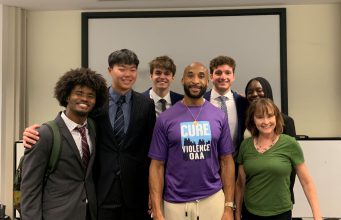Goizueta Undergraduates Conduct Directed Study on AI’s Impact on Consulting
Artificial Intelligence (AI) is a new frontier, or as some say, the “Wild West” of tech. After performing a directed study on the subject, Jonathan Fineman 24BBA and Zaim Zibran 24BBA note that experts liken the arrival of AI to the Industrial Revolution.
If that sentiment puts you on edge, it’s ok: Fineman and Zibran haven’t forgotten to factor the complex human emotions surrounding major technological shifts into their calculations.
What brims with infinite possibility to some breathes an existential threat to others. As with any major technological development in human history, the cards will be reshuffled and money and power will flow in new directions. There are lingering questions about what will be lost, what will be gained, and the “law of unintended consequences.”
When it comes to the consulting industry, how will the chips land? Rather than wait and see, Fineman and Zibran decided to seek answers themselves.
“We’ve been witnessing the AI revolution transform every facet of modern life, from our work to even how we decide what gift to buy our best friends,” says Zibran. “So the question we asked ourselves is ‘How can we best prepare as not only consultants in the next few years but also business executives in the next few decades? How do we emerge as leaders who guide the business world and society through this massive transformation?’”
Conducting the Directed Study
A directed study is a semester-long project in which students receive a fair amount of independence to explore an area of academic interest. The study takes place under the mentorship of a professor, in this case, Richard Berlin, associate professor in the practice of organization and management. “That means we have to design the curriculum ground up. We take ownership, from front to end over executing it, and obviously, ensuring quality with Professor Berlin,” says Zibran.
[Professor Berlin] was guiding our takeoff, helping really steer us through the journey. We would course correct when we needed to, and then ensure that we were able to land with a high-quality deliverable.
Jonathan Fineman
Beyond mere curiosity, Fineman and Zibran were motivated by other factors. The first of these was to help themselves and others become proactive entities in the impending upheaval. An informed student base is better equipped to succeed when the tides shift. Plus, they wanted their research to have real use beyond the “ivory tower” of academia. “We viewed this as an opportunity to educate other students in Goizueta Business School,” Zibran says.
The two wanted to envision how consulting firms could change internally with roles and tasks as well as externally in the way they deliver value to the client.

So, Fineman and Zibran began their search online.“We looked at reputable sources, including consulting firms like Deloitte, McKinsey, BCG, Bain, Google Scholar… and more,” Fineman says. “But a key thing that we decided to do to distinguish our research is we also conducted interviews.” The pair interviewed twelve individuals. Some are Emory faculty while others are employees at consulting firms like McKinsey & Company, EY, and Deloitte. “And we used our interviews to supplement what we had already learned and really make that research original,” Fineman says.
The Impact on Consulting
In terms of findings, Fineman and Zibran say that while AI adoption is paramount, it seems to be lagging. “I think we found out that… adoption within organizations and society even is very slow because of inertia and organizational readiness. So, we don’t even have a lot of these data infrastructures ready,” Zibran says. “And people are very inherently afraid of losing agency to AI.”
Despite reluctance, the study doesn’t suggest that AI will make consultants obsolete, but rather augment their work. Consultants will be able to shift time and resources away from mundane tasks and towards higher-level strategic thinking with AI collaboration.
This is sort of the big picture answer from our study: AI cannot fully replace consultants, but more so can augment the existing workflows.
Zaim Zibran
While the finding that AI won’t replace consultants didn’t shock Fineman and Zibran, they did come across a few surprises. “We looked at a BCG and a Harvard study and found that while everybody benefits from AI, top staff benefit the least,” says Fineman. The hypothesis is that AI acts as an equalizer for under-average performers while top performers may not need it as a crutch so to speak. That said, Fineman points out that it’s an indicator that AI needs to grow a bit more.
Secondly, the two found that while generative AI can aid creativity and brainstorming, the same isn’t true of business applications. “There was another BCG Harvard study that showed that 90% of participants improved performance when using generative AI for creative ideation with a 40% improvement on average participants. However, participants using AI for business problem solving, they saw a 23% decline in performance,” Fineman says.
Lastly is the sheer scope of AI’s transformative power to revolutionize every industry. “It matters because consultants are working across different industries,” Fineman says. “That means consultants need to educate themselves on opportunities for how to guide clients through industry-specific AI challenges and opportunities.”
The Impact on Education
Fineman and Zibran insist that AI literacy is going to be critical, and the fundamentals need to start with education. “What is AI? How does it work? What are the different types of AI? And then how do we train AI models to generate output, “ Zibran asks rhetorically. “We don’t want people just using AI without understanding how it works and the logic behind it.”

Fineman and Zibran recommend AI as a larger focus at Goizueta. “We think that it’s important to integrate AI across all existing relevant classes,” Fineman says. The two think that Goizueta should lean headfirst into AI education and perhaps even create a new area of study. “And I think that’s how we leapfrog other universities who may be slow to react to this,” Zibran says.
The Biggest Change to the Future of Work Since the Industrial Revolution
As Fineman and Zibran espouse in their presentation, “Experts liken AI to the Industrial Revolution, with potential to reduce redundancy [and] inspire creativity.”
The Industrial Revolution improved the efficiency of factory production and generated wealth. However, a lot of that wealth ended up in the hands of a small group of people. Some workers enjoyed their crafts less once an assembly line automated the process. Will AI have the same effect?
Reassuringly, Fineman points out that the Industrial Revolution and the tech boom did not replace humans in the work force. “We’re pretty optimistic that with AI, it will be very similar. AI is not going to replace people, but will empower them…” Fineman says. AI will change the nature of jobs, and some jobs will become obsolete, but many new jobs will be created.
In the past, machines were only available to those with capital. Now, though, AI is accessible and can be a skill leveler. While one may have needed an innate gift in the past, AI can be an elevator to those with average abilities. Ensuring AI literacy is critical to leveling the playing field.
Interested in pursuing a business degree? Learn more about the unique programs Goizueta has to offer.
The future of business education is here, and it’s bold. Goizueta has transformed the traditional classroom into a dynamic digital ecosystem with virtual reality (VR), augmented reality (AR), artificial intelligence (AI), and holographic capabilities. Learn more about innovation at Goizueta here.











